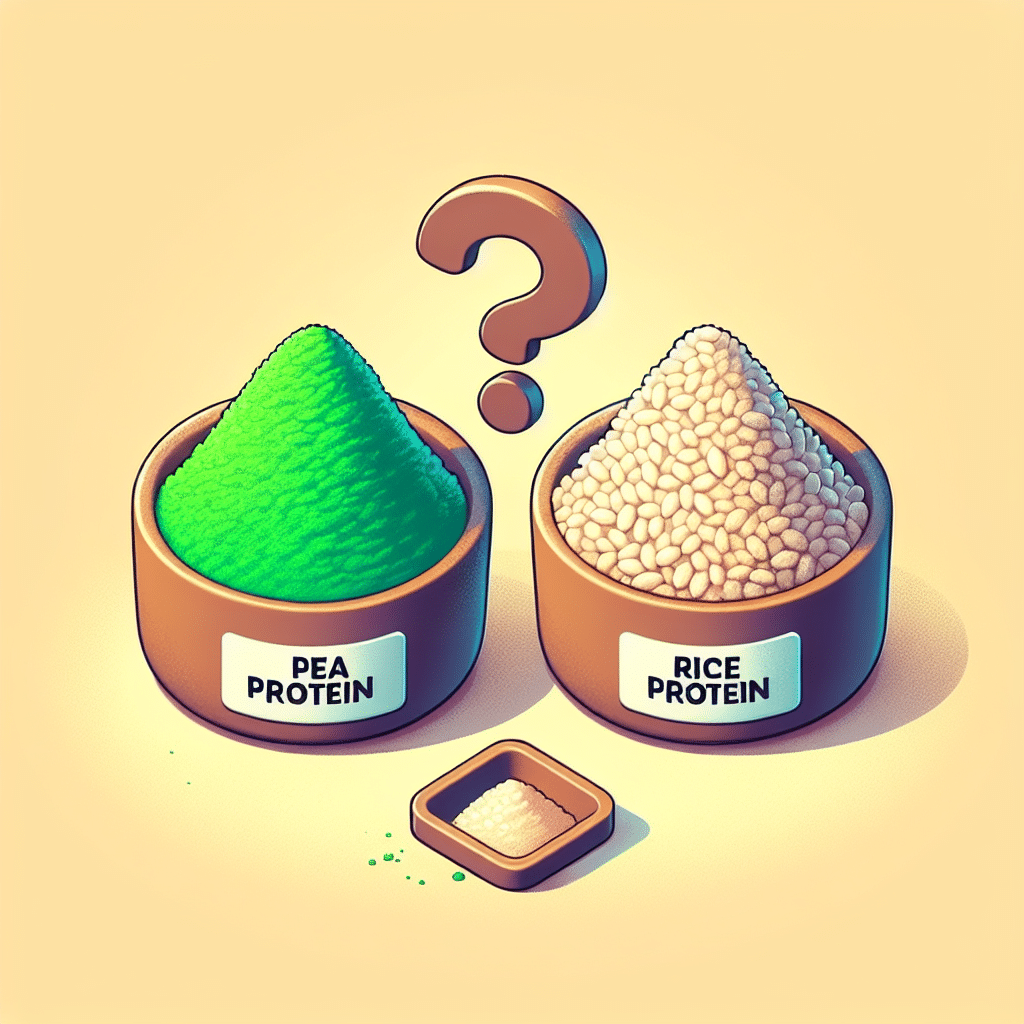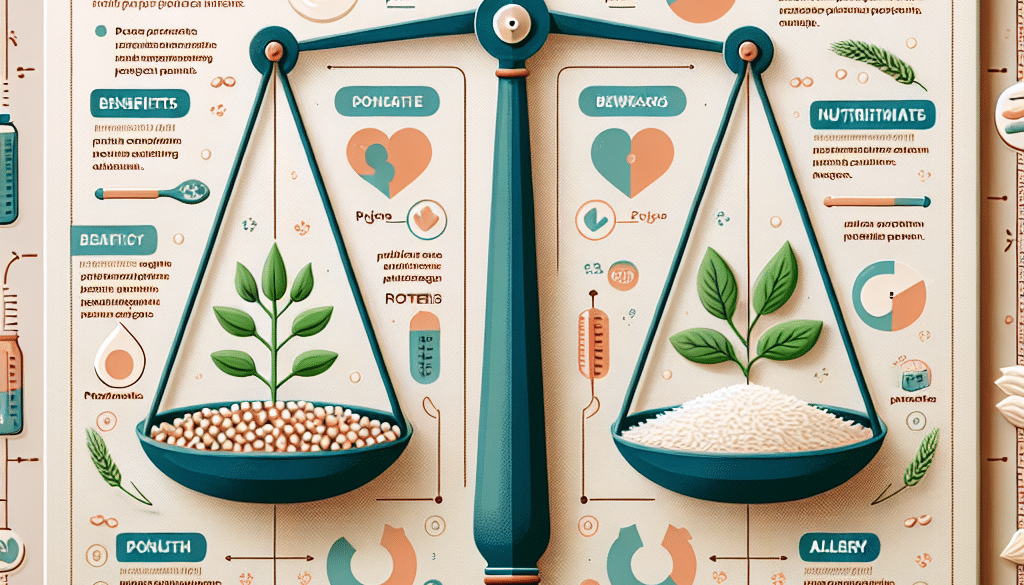What Is Better Pea Protein Or Rice Protein?
-
Table of Contents
- Pea Protein vs. Rice Protein: Which Is the Superior Plant-Based Option?
- Understanding Pea Protein
- Exploring Rice Protein
- Comparing Nutritional Profiles
- Pea Protein Benefits:
- Rice Protein Benefits:
- Amino Acid Profile and Muscle Synthesis
- Digestibility and Absorption
- Taste and Texture
- Environmental Impact
- Case Studies and Research
- Conclusion: Making the Right Choice for Your Needs
- Discover ETprotein’s Premium Plant-Based Proteins
Pea Protein vs. Rice Protein: Which Is the Superior Plant-Based Option?

As the demand for plant-based nutrition continues to grow, consumers and fitness enthusiasts are often faced with the choice between various protein supplements. Among the most popular are pea protein and rice protein, both of which are vegan-friendly and hypoallergenic. This article delves into the benefits and drawbacks of each, helping you decide which protein source might be better suited to your dietary needs and health goals.
Understanding Pea Protein
Pea protein is derived from yellow split peas and is a high-quality alternative to soy and whey proteins. It’s rich in essential amino acids, particularly branched-chain amino acids (BCAAs) like leucine, isoleucine, and valine, which are crucial for muscle growth and repair.
- Complete Protein: Pea protein is nearly a complete protein, which means it contains all nine essential amino acids that the body cannot produce on its own.
- Hypoallergenic: It’s a great option for those with allergies to dairy or soy.
- Environmentally Friendly: Pea protein has a lower environmental footprint compared to animal-based proteins.
Exploring Rice Protein
Rice protein is typically made from brown rice and is another excellent plant-based protein source. It’s naturally gluten-free and easy to digest, making it a suitable option for those with sensitive stomachs or gluten intolerance.
- High Digestibility: Rice protein is gentle on the digestive system and is less likely to cause gastrointestinal discomfort.
- Rich in Cysteine: It contains higher levels of the amino acid cysteine, which can help support glutathione production, a powerful antioxidant.
- Low Allergenic Potential: Rice protein is hypoallergenic and well-tolerated by most individuals.
Comparing Nutritional Profiles
When it comes to nutritional content, both pea and rice proteins offer unique benefits. Pea protein is slightly higher in protein content per serving and has an edge with its BCAA profile, which is particularly beneficial for muscle building. Rice protein, on the other hand, is a good source of fiber and can aid in digestion.
Pea Protein Benefits:
- Rich in iron
- Supports muscle growth
- May help with weight loss by promoting satiety
Rice Protein Benefits:
- Good source of complex carbohydrates and fiber
- May aid in liver function due to the presence of threonine
- Contains methionine, which pea protein lacks
Amino Acid Profile and Muscle Synthesis
For athletes and bodybuilders, the amino acid profile is a critical factor in choosing a protein supplement. Pea protein’s rich BCAA content makes it a strong contender for muscle synthesis. However, rice protein, despite being lower in BCAAs, can still support muscle repair and growth when consumed in adequate amounts.
Digestibility and Absorption
Both pea and rice proteins are easily digestible, but rice protein may have a slight advantage for individuals with extremely sensitive digestive systems. Pea protein’s higher protein content might require more effort to digest, but it is still considered gentle compared to other protein sources.
Taste and Texture
The taste and texture of protein powders can be a deal-breaker for some. Pea protein tends to have a thicker texture and a more distinct taste, which might not be appealing to everyone. Rice protein is often described as having a milder flavor and a smoother texture, making it a more versatile option for shakes and baking.
Environmental Impact
Both pea and rice proteins are more sustainable than animal-based proteins. However, pea protein is particularly notable for its low water usage and minimal impact on soil quality, making it an environmentally conscious choice.
Case Studies and Research
Several studies have compared plant-based proteins to traditional whey protein, with promising results for both pea and rice proteins. A 2015 study published in the Journal of the International Society of Sports Nutrition found that pea protein promoted muscle thickness gains just as effectively as dairy-based protein.
While there is less research on rice protein, a study published in Nutrition Journal in 2013 reported that rice protein isolate could provide similar benefits to whey protein in terms of body composition and exercise performance when taken post-workout.
Conclusion: Making the Right Choice for Your Needs
Ultimately, the choice between pea protein and rice protein comes down to personal preference, dietary restrictions, and specific health goals. Both are excellent sources of high-quality, plant-based protein that can support muscle growth, weight management, and overall health.
For those looking for a more complete amino acid profile and higher protein content, pea protein may be the better option. If you prioritize digestibility and a milder taste, rice protein could be more suitable. It’s also worth considering combining the two to create a more balanced amino acid profile and enjoy the benefits of both.
Discover ETprotein’s Premium Plant-Based Proteins
If you’re in the market for high-quality plant-based protein powders, ETprotein offers a range of products that cater to various dietary needs and preferences. Their organic rice protein and pea protein are characterized by a neutral taste, non-GMO, and allergen-free attributes, ensuring you get the best in terms of both nutrition and flavor.
ETprotein’s commitment to purity and quality makes their products a top choice for anyone looking to incorporate plant-based proteins into their diet. Whether you’re an athlete, a health enthusiast, or simply looking to improve your nutritional intake, ETprotein has a protein solution for you.
About ETprotein:
ETprotein, a reputable protein and L-(+)-Ergothioneine (EGT) Chinese factory manufacturer and supplier, is renowned for producing, stocking, exporting, and delivering the highest quality organic bulk vegan proteins and L-(+)-Ergothioneine. They include Organic rice protein, clear rice protein, pea protein, clear pea protein, watermelon seed protein, pumpkin seed protein, sunflower seed protein, mung bean protein, peanut protein, and L-(+)-Ergothioneine EGT Pharmaceutical grade, L-(+)-Ergothioneine EGT food grade, L-(+)-Ergothioneine EGT cosmetic grade, L-(+)-Ergothioneine EGT reference grade and L-(+)-Ergothioneine EGT standard. Their offerings, characterized by a neutral taste, non-GMO, allergen-free attributes, with L-(+)-Ergothioneine purity over 98%, 99%, cater to a diverse range of industries. They serve nutraceutical, pharmaceutical, cosmeceutical, veterinary, as well as food and beverage finished product distributors, traders, and manufacturers across Europe, USA, Canada, Australia, Thailand, Japan, Korea, Brazil, and Chile, among others.
ETprotein specialization includes exporting and delivering tailor-made protein powder and finished nutritional supplements. Their extensive product range covers sectors like Food and Beverage, Sports Nutrition, Weight Management, Dietary Supplements, Health and Wellness Products, and Infant Formula, ensuring comprehensive solutions to meet all your protein needs.
As a trusted company by leading global food and beverage brands and Fortune 500 companies, ETprotein reinforces China’s reputation in the global arena. For more information or to sample their products, please contact them and email sales(at)ETprotein.com today.












